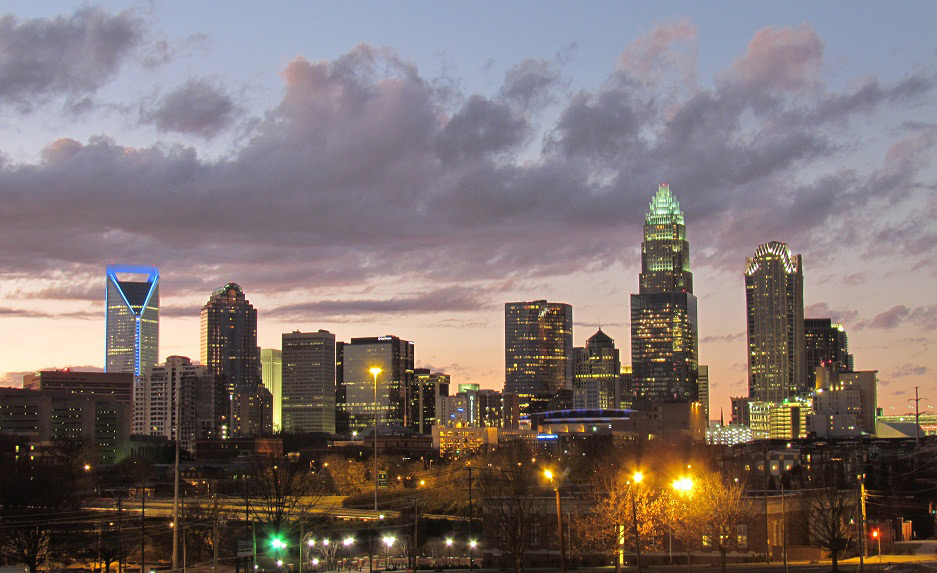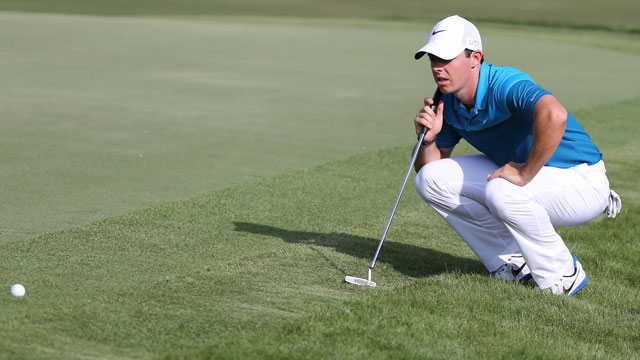EVENTS
The Queen City is ready for its first major

With the PGA Championship coming to Quail Hollow, Charlotte is about to become a golf town.
Not to be confused with Charlotte, the basketball town, where the locals once held a ticker-tape parade for a Hornets team that went 20-62. Or Charlotte, the football town, where it took the Panthers only two years of existence to charge into the NFL playoffs and knock out the defending Super Bowl champions. Or Charlotte, the NASCAR town, where the drivers are asked to drive 600 miles on a Sunday evening in late May — the distance from Kansas City to Cincinnati — for the chance to stand where Dale Earnhardt once stood.
There was a day that Charlotte had its speedway, some college basketball, a fervent love of professional wrestling — for a lot of the constituency, if the city had had a Mount Rushmore of sports, Ric Flair would be on it — and that was pretty much it. But then came the Hornets and the Panthers and the chance to host a Final Four — and now its first golf major.
By the way, the PGA does have a stop in Charlotte. The Wells Fargo Championship, which was born as the Wachovia Championship. They have played the tournament 15 times and needed playoffs in seven of them. Rory McIlroy won in 2015 with a third-round 61. So they knew golf drama in Charlotte.
Then again, they’ve known drama in lots of sports in Charlotte.

This is the city where Arkansas won its only national basketball championship, in 1994, when a former high school student council president named Scotty Thurman lofted a rainbow 3-pointer as the shot clock expired to break a 70-70 tie with Duke in the final minute. Cheering from above was First Hog Fan Bill Clinton, the only sitting U.S. president to ever show up at a Final Four.
“I was worried to the very end,” he said afterward.
This is the city where Kobe Bryant was a Hornet – for about 15 minutes. Actually, two weeks. The Hornets drafted the high schooler in 1996 with the 13th pick and then, as planned, traded him 15 days later to the Lakers for Vlade Divac. Stories differ on exactly what was behind the deal, but this we all know – NBA history would be far different had it not happened.
This is the city where the Panthers started playing football in 1995, and by the end of 1996 were 12-4 and in the playoffs. They promptly knocked out the Dallas Cowboys of Troy Aikman and Emmitt Smith and Michael Irvin and Deion Sanders, 26-17, as the stadium and the state rocked. America’s Team humbled by upstarts. The Cowboys drove inside the 5-yard line four times that day and scored one touchdown. “We’re the new kids on the block,” Carolina linebacker Lamar Lathon announced.
Green Bay and Brett Favre took care of the Panthers the next week in the NFC Championship, but Carolina would eventually see two Super Bowl teams, each losing memorably.
The first was in 2004, with the Panthers staring down the business end of the New England Patriots dynasty, just two years removed from a 1-15 record. Super Bowl XXXVIII was scoreless for nearly 27 minutes, then did a U-turn, and 37 points were scored in the fourth quarter – the last three on Adam Vinatieri’s field goal with four seconds left to win it for the Patriots, 32-29. “It’s all or nothing,” star receiver Steve Smith said afterward. “And right now, we have nothing.”
There was 2016 – Super Bowl 50 – with Cam Newton and an offense that no one had been able to stop. Not in a 15-1 regular season, not in a 49-15 NFC Championship Game thrashing of Arizona.
But the Denver Broncos stopped it. Sacking Newton six times and forcing four turnovers, Denver beat the Panthers 24-10 in Peyton Manning’s last game. Never mind Carolina outgained the Broncos 315-194 and had 10 more first downs. A frustrated and dour Newton had few comments afterward — “They just played better than us. I don’t know what else you want me to say” – and quickly walked out of his press conference. If he couldn’t evade the Denver rush, he showed he could scramble away from the media.
At least the Panthers were in championship games. The Hornets have never come close. Charlotte has loved them anyway.
This is the city that in 1989 — the first Hornets team having finished 20-62 – held a parade down the main drag of Tryon Street to show appreciation with confetti and 10,000 balloons. “The best fans not only in the NBA, but in the world in any sport,” Kurt Rambis said that day.
Charlotte would lead the league in attendance in eight of its first nine years, but the first playoff victory did not come until 1993, theatrically, 99-98 in two overtimes in Boston Garden against the aging Celtics. Days later, the Hornets clinched the series 104-103 on Alonzo Mourning’s last-second shot.
The original Hornets left for New Orleans in 2002, to be replaced three years later by the Bobcats, who later restored the Hornets name. Michael Jordan now sits in the owner’s chair, but hasn’t found the magic formula. Charlotte hasn’t advanced past the first round of the playoffs since 2002.
Then there’s the college side of basketball. This is the city that sent one of the first mid-major darlings to the Final Four. That was Charlotte in 1977, led by Cedric Maxwell. The road ended in anguish; a 51-49 loss to Marquette on Jerome Whitehead’s basket at the buzzer, after he outmaneuvered the defense — and may or may not have fouled doing it — to catch a court-length pass from Butch Lee. Imagine Grant Hill to Christian Laettner, only with a layup at the end.
This is also the city — or at least one of its neighbor towns — that sent Davidson to the Elite Eight in 2008, as the world was introduced to a wondrous shooter named Stephen Curry. Watching it all from courtside was father Dell Curry, who was already a Charlotte folk hero as a super sub. He remains the Hornets’ all-time leading scorer, even though he started only 77 games in 10 years.
The ACC occasionally plays its postseason tournament in Charlotte. On the pain-o-meter, it would be hard to beat 1970, when South Carolina was upset in the title game 42-39 in two overtimes by North Carolina State. Back then, only the champion could go to the NCAA tournament, so South Carolina stayed home with a 25-3 record.
The women played a Final Four in Charlotte in 1996, won by Tennessee over Georgia. The defining moment was the semifinals, when the Volunteers went overtime to knock off Connecticut 88-83. The Tennessee-UConn rivalry was in full bloom.
But most of all, this is the city of NASCAR, with multiple events, but especially the one on Memorial Day weekend. Born as the World 600 in 1960, now the Coca-Cola 600, that race is one of the pillars of the sport.
There was the inaugural event in 1960, won by Joe Lee Johnson but remembered more for future TV race broadcaster Chris Economaki, then taking pictures, running to the aid of driver Lenny Page after a bad accident, helping to save his life.
There was the World 540 in 1974, the race shortened because of a national energy crisis, and the 54 lead changes in 1979, Jimmie Johnson’s threepeat and Darrell Waltrip’s five victories. And there was 1994, when 22-year-old Jeff Burton won for the first time, and much of NASCAR’s fandom split into two camps. Burton on one side, Earnhardt the other, new kid vs. good ol’ boy. Nicklaus vs. Palmer only with tires.
Now comes the PGA Championship to this city of loud arenas, loud stadiums, loud wrestling rings and loud tracks. Another big event for the city to own. Only this one is a little quieter.
